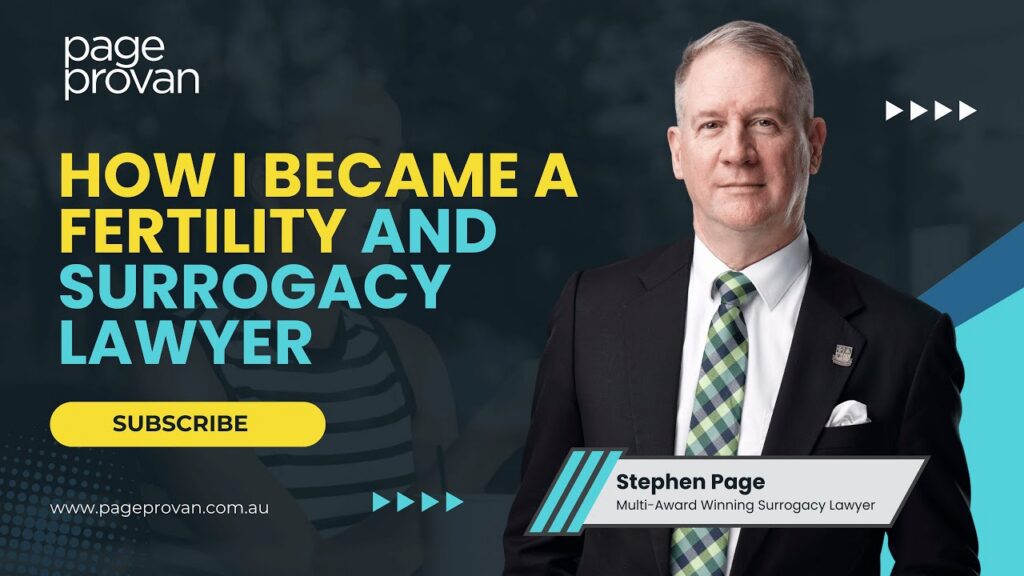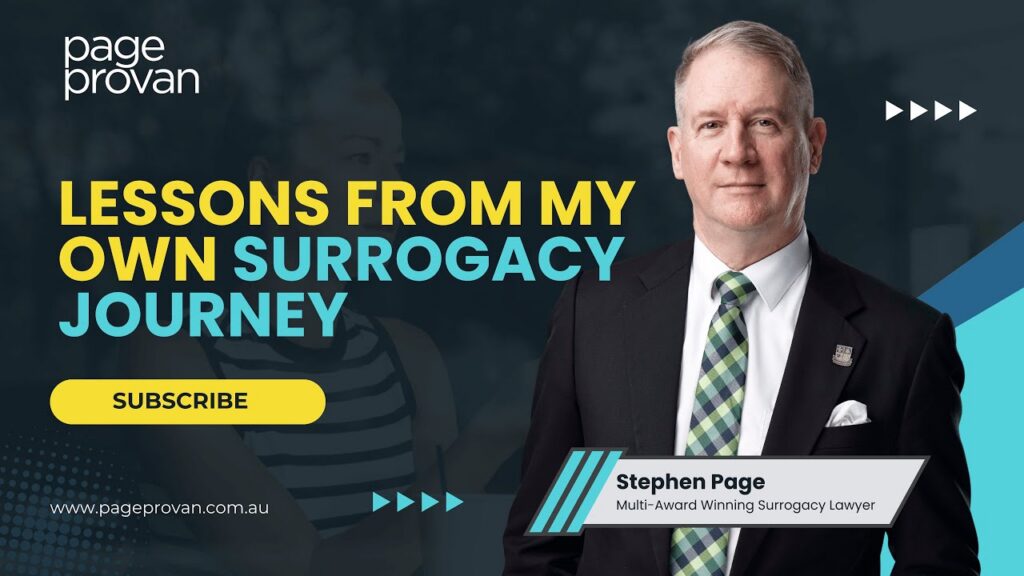What My First Surrogacy Client Taught Me
In this video, Award-Winning Fertility Lawyer and Accredited Family Law Specialist, Stephen Page reflects on what his first surrogacy client taught him.
Transcript
G’day, I’m Stephen Page from Page Provan, Family and Fertility Lawyers. Since 1988, I have advised in over seventeen-hundred surrogacy journeys for clients throughout Australia and at last count thirty-one countries overseas. Everywhere from America, parts of America, Europe and Asia, and even in our backyard.
I’ve had clients from the wheat belts of Western Australia, the Pilbara, Perth, the Top End, even the outback from Adelaide and other parts of South Australia, from Melbourne and regional Victoria, from various parts in Tasmania, the ACT, Sydney and regional New South Wales, and up and down the Coast in Queensland. I’ve been very lucky to help all these people on their journey towards parenthood.
But my first client with surrogacy was in 1988. I’d just been admitted over a year. I was green, I was young, and this woman came into my suburban office in Brisbane and said, well, I want your help, I need some advice because I’ve been paid a sum of money by this couple to have a child, and I’ve got the money and I’ve got the baby, he’s a boy, and I want to know whether I can keep both the baby and the money.
I was horrified, and I admittedly felt for the couple that they had gone through this journey, and here they were at the other end, having spent this money and got their promises up with this woman and they weren’t going to have a child. I thought, that’s pretty rough.
But what was my advice? Well, the contract was void because Queensland had just passed laws at that stage that said any form of surrogacy, whether it was paid or not and whether it was her egg or not, so what we call traditional or gestational, whether it happened in Queensland or not, if it was by Queenslanders, was criminal, and the agreement was void.
Now thankfully, those laws have changed, they’ve gone, but those laws are in place, and I said to her, well, what you’ve entered into is a criminal agreement. It’s a criminal offence under the law at this stage in Queensland, and with a criminal agreement, it’s void and that means that the money lays where it falls.
You’ve got the money, you get to keep it, they can’t get it back from you. But what about the baby? Well, I discovered quickly that the child was not conceived in an IVF clinic.
It had happened at home and that meant that she was the genetic mother. It’s what we now call traditional surrogacy, and so what did that mean? Well, they could go to court, chances are you’ve got about a fifty percent chance, probably higher, that you’ll be successful because this is your child.
I doubt whether a family court judge will want to take this child away from you because you’ll say, yeah I had that agreement, but this is my child, and the pain of removing this child from me is too great, and I can’t cope with that, and then the child’s best interest should be with its mother would be a lot of the thinking. But I said, chances are it will never, ever go to court. Why not? She said, well, because it’s a criminal offence. These people aren’t going to put themselves in harm’s way.
They’re not going to go to court and therefore ask a judge to say, well, Mr. Police Officer, could you please prosecute them? They don’t want a referral to the authorities to be prosecuted. So chances are it will never go to court. It never did. This little baby boy, if he’s still alive, will be over 30.
I don’t know whether he’s ever been told the truth of his conception. This case has demonstrated to me the need for regulation of surrogacy, the need for there to be counselling before it starts, for legal advice before it starts, so that everyone goes into the deal clear eyed, and of course this was commercial surrogacy, which is outlawed throughout Australia, except the Northern Territory, and that’s changing soon.
It would have been a criminal offence even now. But it just showed to me that if this couple and this woman had legal advice, and had that counselling, and the deal was lawful at the time because they would have got advice about this, they probably wouldn’t have had to pay any money. It would have worked. It would have worked, and they wouldn’t have had to go through all that pain. So prevention is better than cure.
If you look at getting this done right in the first place, make sure you have that legal advice, make sure you have that counselling so that you know you’re doing it right. Go to a lawyer who knows what they’re doing and have that as a smooth journey, not a journey which is going to be rocky and painful like it was for all of those people.












